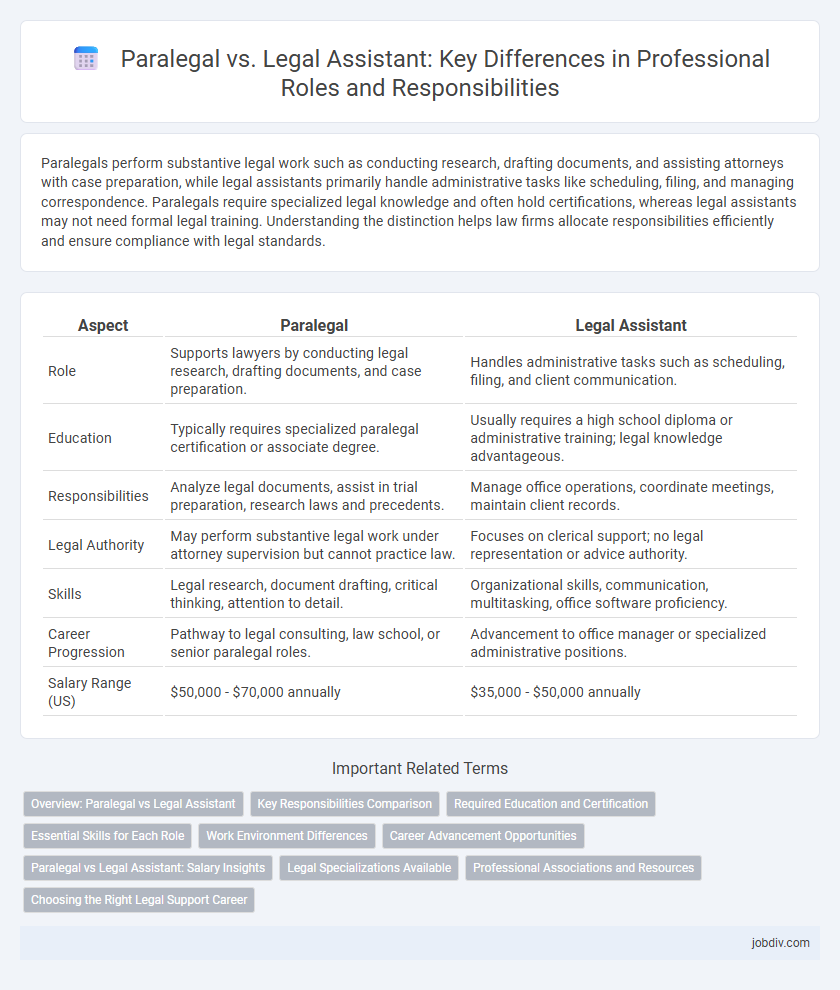Paralegals perform substantive legal work such as conducting research, drafting documents, and assisting attorneys with case preparation, while legal assistants primarily handle administrative tasks like scheduling, filing, and managing correspondence. Paralegals require specialized legal knowledge and often hold certifications, whereas legal assistants may not need formal legal training. Understanding the distinction helps law firms allocate responsibilities efficiently and ensure compliance with legal standards.
Table of Comparison
| Aspect | Paralegal | Legal Assistant |
|---|---|---|
| Role | Supports lawyers by conducting legal research, drafting documents, and case preparation. | Handles administrative tasks such as scheduling, filing, and client communication. |
| Education | Typically requires specialized paralegal certification or associate degree. | Usually requires a high school diploma or administrative training; legal knowledge advantageous. |
| Responsibilities | Analyze legal documents, assist in trial preparation, research laws and precedents. | Manage office operations, coordinate meetings, maintain client records. |
| Legal Authority | May perform substantive legal work under attorney supervision but cannot practice law. | Focuses on clerical support; no legal representation or advice authority. |
| Skills | Legal research, document drafting, critical thinking, attention to detail. | Organizational skills, communication, multitasking, office software proficiency. |
| Career Progression | Pathway to legal consulting, law school, or senior paralegal roles. | Advancement to office manager or specialized administrative positions. |
| Salary Range (US) | $50,000 - $70,000 annually | $35,000 - $50,000 annually |
Overview: Paralegal vs Legal Assistant
Paralegals offer substantive legal support by conducting research, drafting documents, and assisting attorneys in case preparation, often requiring formal education and certification. Legal assistants handle administrative tasks such as managing schedules, organizing files, and communicating with clients, emphasizing office management skills over legal expertise. Understanding the distinct roles improves law office efficiency and clarifies professional responsibilities within legal teams.
Key Responsibilities Comparison
Paralegals conduct legal research, draft documents, and assist attorneys in case preparation, often handling complex legal tasks that require specialized knowledge. Legal assistants primarily manage administrative duties such as scheduling, correspondence, and file organization to support legal teams efficiently. Understanding these distinct roles is crucial for optimizing workflow and ensuring accurate legal support within law firms.
Required Education and Certification
Paralegals typically require an associate degree in paralegal studies or a bachelor's degree in another field combined with a paralegal certificate, while legal assistants may only need a high school diploma or some college coursework. Certification options for paralegals include the National Association of Legal Assistants' Certified Paralegal (CP) credential and the National Federation of Paralegal Associations' Registered Paralegal (RP) designation, which enhance professional credibility. Legal assistants often work without formal certification, relying on on-the-job training and experience to fulfill their responsibilities.
Essential Skills for Each Role
Paralegals possess strong legal research, drafting, and client communication skills crucial for supporting attorneys in case preparation and document review. Legal assistants excel in administrative tasks such as managing schedules, organizing files, and coordinating office operations to ensure efficient workflow. Both roles require attention to detail, proficiency in legal software, and a solid understanding of legal terminology, but paralegals typically engage more deeply with substantive legal analysis.
Work Environment Differences
Paralegals typically work in law firms, corporate legal departments, or government agencies, where they perform substantive legal tasks such as research and drafting documents under attorney supervision. Legal assistants are often found in similar settings but focus more on administrative support including scheduling, correspondence, and maintaining legal files. The distinction in work environment reflects paralegals' closer involvement with legal processes, whereas legal assistants provide essential organizational support to streamline office operations.
Career Advancement Opportunities
Paralegals typically have more specialized legal training and certification, which can lead to higher-level positions such as senior paralegal or legal analyst. Legal assistants often perform administrative duties, limiting their direct involvement in legal research and case preparation, potentially constraining career growth within legal practice areas. Advancing as a paralegal usually requires continuous legal education and passing certification exams, enhancing prospects for leadership roles in law firms or corporate legal departments.
Paralegal vs Legal Assistant: Salary Insights
Paralegals typically earn higher salaries than legal assistants due to their advanced responsibilities and specialized legal knowledge. The Bureau of Labor Statistics reports the median annual wage for paralegals is approximately $56,230, while legal assistants average closer to $48,500. Factors influencing salary differences include geographic location, firm size, and level of experience within the legal industry.
Legal Specializations Available
Legal assistants and paralegals offer specialized support in various legal fields such as corporate law, family law, criminal law, and intellectual property. Each specialization demands specific knowledge, with paralegals often undertaking more complex tasks like case law research and drafting legal documents, while legal assistants handle administrative duties. Understanding these distinctions aids law firms in allocating resources efficiently based on the expertise required for different legal practices.
Professional Associations and Resources
Professional associations such as the National Association of Legal Assistants (NALA) offer certifications and continuing education specifically for paralegals, enhancing their expertise and career development. Legal assistants often benefit from memberships in local bar associations and access to resources like legal research databases and office management tools tailored to support their administrative responsibilities. Both roles rely on these organizations and resources to stay current with legal trends, ethical standards, and industry best practices.
Choosing the Right Legal Support Career
Paralegals typically require formal education and certification, specializing in legal research, drafting documents, and case management, whereas legal assistants often provide administrative support without extensive legal training. When choosing the right legal support career, consider your interest in substantive legal work versus clerical responsibilities and the level of education you are willing to pursue. Employers often seek paralegals for roles demanding detailed legal knowledge, making certification programs and specialized courses crucial for career advancement.
Paralegal vs Legal Assistant Infographic

 jobdiv.com
jobdiv.com